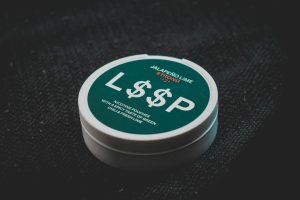As youth e-cigarette use remains a public health concern with 1.63 million middle and high school students reporting e-cigarette use in 2024, a different type of flavored nicotine product is gaining popularity: oral nicotine pouches.
With cigarette smoking on the decline, tobacco companies have shifted focus to “smokeless” tobacco products, including oral nicotine pouches. The pouches are sometimes referred to as a “lip pillow” or “upper decky” because of where they are placed between the lip and gum, often under the upper lip. Oral nicotine pouches are used similarly to snus – an oral pouch containing shredded tobacco leaf – but unlike snus, they contain a nicotine powder instead of tobacco leaf. Nicotine pouches contain nicotine which is harmful to young people in any form. Due to the absence of tobacco leaf, the Food and Drug Administration does not classify oral nicotine pouches as a smokeless tobacco product.
Oral nicotine pouches include brands such as Zyn, On! and Velo. Oral nicotine pouches have gained popularity in recent years, and are now the second most commonly used tobacco product among middle and high school students, following e-cigarettes. Overall sales of nicotine pouch products increased from 126.06 million units from August to December 2019 to 808.14 million units from January to March 2022. During this period, sales of nicotine pouch products containing a higher concentration of nicotine (8 mg) increased more rapidly than products with lower nicotine concentrations (e.g., 4 mg and 6 mg). In addition, Altria has announced to its investors that it will be introducing a new version of its On! nicotine pouch product that has a higher concentration of nicotine than its current On! products.

Advertisements for oral nicotine pouches highlight flavors and emphasize the “freedom” of using nicotine pouches anywhere, according to new research co-authored by Truth Initiative. Leading nicotine pouch brands spent nearly $25 million on ads between January 2019 and September 2021.
In the past, Truth Initiative has submitted recommendations that federal agencies monitoring tobacco use include measures for oral nicotine pouches in national surveys. In 2022, the CDC included oral nicotine pouches in their National Youth Tobacco Survey where they estimated that 1.1% of middle and high school students had used these products. In 2024, current use of nicotine pouches among middle and high school students rose to 1.8%. As more information emerges, here are some important things to know about these products.
How much nicotine is in oral nicotine pouches?
Nicotine concentrations differ across oral nicotine pouch brands. For example, in the United States Zyn is sold in 3 and 6 mg, Velo is sold in 2, 4, and 7 mg, and On! is sold in 1.5, 2, 3.5, 4, and 8 mg, according to each brand’s website. Altria’s new On! nicotine pouch product, called On! Plus, will offer nicotine strengths of 6, 9, and 12mg.
What flavors do nicotine pouches come in?
Oral nicotine pouches come in an array of youth-friendly flavors, including fruit, mint, and other flavors.
The availability of sweet, fruity, and candy-like flavors is troubling because, as pod-based e-cigarettes like JUUL face federal flavor restrictions in response to high rates of youth vaping, young people may switch to other nicotine products that still offer flavors. For example, disposable e-cigarettes, which were exempted from the partial flavor restrictions FDA enacted in January 2020, have skyrocketed in popularity. Sales of menthol-flavored e-cigarettes, which were also exempted, experienced a drastic, immediate rise in sales with an increase of almost $60 million and its market share more than doubled.
Flavors play a significant role in drawing youth to tobacco products – 87.6% of young e-cigarette users reported using a flavored product in 2024.
How are oral nicotine products regulated?
Oral nicotine products are, as yet, not regulated as tightly as other tobacco products. The FDA places some regulations on these products, including requirements that manufacturers submit certain information to the agency, use nicotine warning labels, and comply with some basic marketing restrictions. No current federal regulations exist that prevent or restrict the sale of oral nicotine pouches, and the marketing restrictions on these products are not as strict as those on combustible tobacco products.
What are the health effects of oral nicotine pouches?
While specific long-term health effects of nicotine pouches like Zyn remain unknown, youth use of nicotine in any form is unsafe. Nicotine use during adolescence can disrupt the formation of brain circuits that control attention, learning, and susceptibility to addiction. Research has shown early age of nicotine use is correlated with daily use and lifetime nicotine dependence. Nicotine use can also intensify symptoms of depression and anxiety.
Truth Initiative strongly urges the FDA to remove all unauthorized oral nicotine products from the market, including Zyn. To prevent youth from using these products, eliminating all flavors from tobacco products is crucial, as is instituting restrictions to curb exposure to marketing.
Quitting Zyn and oral nicotine pouches
Quitting oral nicotine pouches like Zyn can be challenging, and the high levels of nicotine in Zyn can lead to nicotine addiction. The good news is, you can quit Zyn with similar strategies used to quit other nicotine products.
Read about how to quit Zyn and other oral nicotine pouches from EX, a proven-effective tobacco cessation program directed and funded by Truth Initiative.
Source: Truth Initiative










